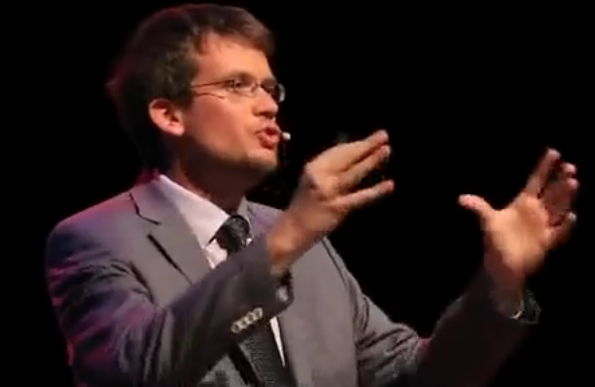Ze isn't just a great public intellectual, he's also a brilliant community builder,
泽不仅是一名出色的公知,而且是一名优秀的社团组织者,
and the community of people that built up around these videos was in many ways a community of learners.
因为这些视频而聚集到一起的这些人,在很大程度上而言组成了一个学习社团。
So we played Ze Frank at chess collaboratively, and we beat him.
我们与泽·弗兰克下国际象棋,多对一,结果我们赢了。
We organized ourselves to take a young man on a road trip across the United States.
我们带着一个年轻人自驾游走遍了美国。
We turned the Earth into a sandwich, by having one person hold a piece of bread at one point on the Earth,
我们把地球变成了一个三明治,方法是让一个人举着一片面包站在地球的某一处,
and on the exact opposite point of the Earth, have another person holding a piece of bread.
然后在地球对面相对的地点,安排另一个人也举着片面包。
I realize that these are silly ideas, but they are also "learny" ideas, and that was what was so exciting to me,
我知道这主意很蠢,但是也有值得学习的地方不是吗,而这让我非常兴奋,
and if you go online, you can find communities like this all over the place.
如果你在网上搜一下,你能找到很多类似的社团。
Follow the calculus tag on Tumblr, and yes, you will see people complaining about calculus,
如果你在Tumblr搜索微积分的标签,没错,你会看到很多人在吐槽微积分,
but you'll also see people re-blogging those complaints, making the argument that calculus is interesting and beautiful,
但同时你也会发现有很多人转发这些吐槽,然后争论其实微积分很有趣也非常美,
and here's a way in to thinking about the problem that you find unsolvable.
一些你自己无法解答的问题,都可以在上面找到思路。
You can go to places like Reddit, and find sub-Reddits, like "Ask a Historian" or "Ask Science,"
你可以去Reddit这样的网站,找到sub-Reddit栏目,比如“向历史学家提问”或者“了解科学知识”,
where you can ask people who are in these fields a wide range of questions, from very serious ones to very silly ones.
你可以向相关领域专家提问,什么问题都可以,从国计民生到花边新闻。
But to me, the most interesting communities of learners that are growing up on the Internet right now are on YouTube,
然而对我而言,网上出现的最吸引人的学习社区是YouTube,
and admittedly, I am biased. But I think in a lot of ways, the YouTube page resembles a classroom.
我承认,我是脑残粉。但我觉得,从多方面来看,YouTube页面就像一间教室。

Look for instance at "Minute Physics," a guy who's teaching the world about physics:
举个例子,《一分钟学物理》这个视频,这个人在教全世界学物理:
Let's cut to the chase. As of July 4, 2012,
言归正传。2012年7月4日,
the Higgs boson is the last fundamental piece of the standard model of particle physics to be discovered experimentally.
希格斯玻色子通过实验被发现,补全了粒子物理学标准模型的最后一块。
But, you might ask, why was the Higgs boson included in the standard model,
但是你们也许会问,为什么希格斯玻色子会被包含在标准模型中,
alongside well-known particles like electrons and photons and quarks, if it hadn't been discovered back then in the 1970s?
而其他著名的粒子比如电子、光子和夸克则被排除在外。仅仅因为它不是在70年代被发现的吗?
Good question. There are two main reasons.
问得好。原因主要有两点。
First, just like the electron is an excitation in the electron field,
首先,正如电子是电场中的一种激发现象,
the Higgs boson is simply a particle which is an excitation of the everywhere-permeating Higgs field.
希格斯玻色子同样也是一种激发现象,发生于无处不在的希格斯场。
The Higgs field in turn plays an integral role in our model for the weak nuclear force.
而反过来,希格斯场在我们的弱相互作用模型中又扮演了不可或缺的角色。
In particular, the Higgs field helps explain why it's so weak.
特别是它解释了为什么弱相互作用这么“弱”。
We'll talk more about this in a later video, but even though weak nuclear theory was confirmed in the 1980s,
关于这一点我们将在后面的视频详细介绍,但是尽管弱相互作用理论在80年代就被证实了,
in the equations, the Higgs field is so inextricably jumbled with the weak force,
但在这些等式中,希格斯场与弱相互作用力是如此纠缠不清,
that until now we've been unable to confirm its actual and independent existence.
以至于到现在我们也无法证明希格斯场确实是单独存在的。



